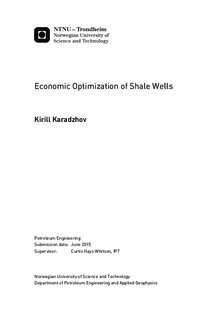Economic Optimization of Shale Wells
Master thesis
Permanent lenke
http://hdl.handle.net/11250/2351058Utgivelsesdato
2015Metadata
Vis full innførselSamlinger
Sammendrag
The worldwide interest in development of unconventional resources resulted into significant changes in the energy market within the last decade. Successful shale revolution in the US opened global perspectives for extensive oil and gas production from shales and pushed technological progress forward. Hundreds of private companies proved that development of shale reserves can be economically attractive; therefore, other countries became interested in their unconventional resources as well. China, Argentina, Russia started focusing on shale oil and gas reservoirs, but their industry is still in infancy stage. Along with limited experience in shale development, they faced several significant hydrocarbon price falls within the last seven years making shale project s economy questionable. Thus, the significance of the balanced project economy through optimized well design came to the front stage.
This thesis deals with economic optimization of shale wells. Under economic optimization we understand the condition when the well reached optimal economic performance based on selected financial metrics. For the project, net present value, discounted profitability index and internal rate of returns are chosen as metrics of interest. We believe that short-term economic performance is more crucial rather than a long-term one; therefore, the simulations are limited by five years time frame. We also study different available cost and revenue models to select the most suitable for this thesis.
For sensitivity analysis we selected a variety of reservoir and completion parameters which have a significant influence on the economic performance of shale wells. No specific well or shale play were chosen for the project. Therefore, our main objective is to provide trends and magnitudes of change of economic performance for different parameters of reservoir-well system.
Substantially, the project covers economic performance of a shale well for three different in-situ fluids (dry gas, gas condensate and oil) with up to nine different sensitivity parameter. In addition, we quantified the effect of gas desorption process and oil and gas price change, and addressed optimal well spacing on 1×2 mi section on total economic performance of the shale project. The achieved results are handy when initial first-order economic evaluation of the project is required and allows to better understand the outcomes when selecting the optimal shale well design.
